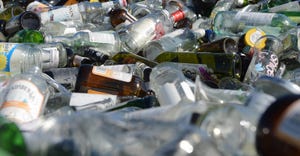Man Bites Dog: The Press and Recycling
Many recyclers are upset and disheartened over the onslaught of negative recycling coverage in the press. So, what do you do when the press calls? Help them.
Is recycling finished? You might think it is based on the onslaught of negative recycling stories in the American press. They paint a woeful picture or imply that most recyclables go to the local waste-to-energy facility, or even proclaim the end of recycling might be right around the corner. With all this relentless negativity, you can’t help but think recycling is doomed.
This problem is worsened because, unfortunately, reporters don’t always get all the facts right. These stories commonly claim that China took the bulk of our recyclables and now they’ve said no to all of them. In fact, export markets, including the Chinese, never took the majority of our recyclables. Domestic markets did and still do.
Nor has the Chinese government banned them all. Yes, mixed paper and mixed plastics are banned. However, that government has made it clear it is happy to accept pulp made from recycled paper along with pellets and resin made from recycled plastics. It just wants the processing done elsewhere. Moreover, China continues to allow sizeable imports of clean old corrugated containers because they are a valuable feedstock for Chinese paper mills. These important points appear to be inconvenient nuances.
Understandably, many recyclers are upset and disheartened over this coverage. I’m frustrated, but I understand that the press thrives on unexpected or bad news. An old journalism maxim says “dog bites man” isn’t news because it’s not unusual. “Man bites dog,” however, is news. After all, how often does that happen? Failing recycling programs are news. The thousands of curbside programs that continue to collect, process and sell recyclables are not.
Part of the problem is simple. Most journalists are generalists. Very few specialize in the environment. Outside of the trade press, none have any expertise in recycling. Instead, when researching a new issue, such as recycling, they read what they find online. Early mistakes get repeated and magnified. After all, another journalist wrote it, so it has to be true. This explains the errors of fact about how much was shipped to China and what has been banned. Add to that the confirmation bias of looking for bad news and finding it and the result is inevitable.
I’ve been dealing with the press ever since I started at the U.S. Environmental Protection Agency several decades ago. I learned quickly that most reporters are just like you and me. They have a job to do and want to do it right. Just like you and I, they are not perfectly objective and have their own biases. Some may not like your industry or organization. Some might have already figured out what they intend to write and are looking to you for confirmation. But most just want to get the facts right and meet their deadline.
So, what do you do when the press calls? Help them. Return their calls quickly. Ask what their deadline is and get your answers to them before it. Know the most important points you want to convey and stay focused on those key messages. Give them accurate data and never lie. Feel free to disagree, but don’t get nasty. After all, the press buys ink and airtime by the barrel.
If a story upsets you, write a response. Keep it short. You have a better chance of getting printed if your response is fewer than 200 words (the first three paragraphs of this column). Stick to the facts. Don’t call the reporter an idiot. Be calm and make your case. If they decide to print your letter, newspapers will usually contact you before they print it. They often do minor editing and want your approval. They also may want proof of claims you made.
Over the years, I’ve had far more good experiences than bad with the press. Sometimes, they may have disregarded what I said. Sometimes, they may have included the key points I made. As long as they listened with an open mind, I’ve been happy with the encounter. I’ve run across a few obviously biased reporters and researchers. But those are relatively rare experiences. They do seem to be increasing, though, especially if plastics are involved. Something about plastic products seem to bring out the worst in some reporters. But even those instances are relatively rare.
Above all, treat the press with respect. When you do, they are more likely to call you back when they need more information.
Chaz Miller is a longtime veteran of the waste and recycling industry. He can be reached at [email protected].
About the Author
You May Also Like


.png?width=300&auto=webp&quality=80&disable=upscale)

